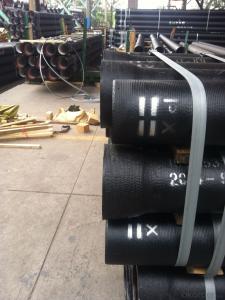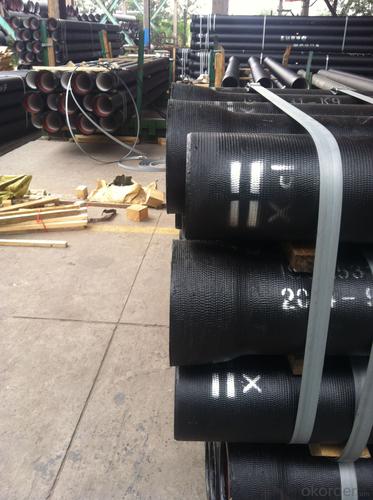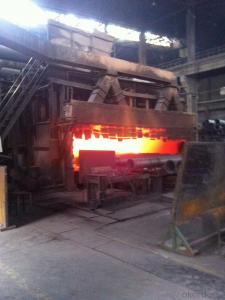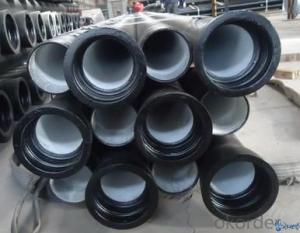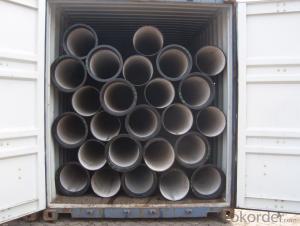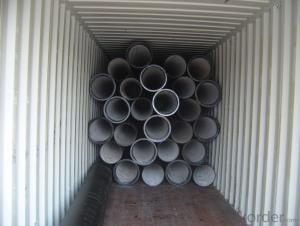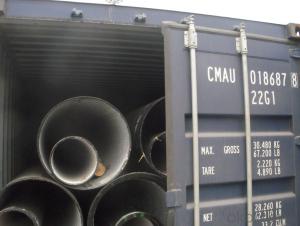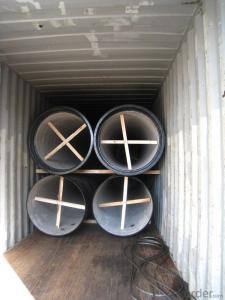DUCTILE IRON PIPES AND PIPE FITTINGS K8 CLASS DN1000
- Loading Port:
- Tianjin
- Payment Terms:
- TT OR LC
- Min Order Qty:
- 22 pc
- Supply Capability:
- 3000 pc/month
OKorder Service Pledge
OKorder Financial Service
You Might Also Like
Material : Ductile Cast Iron
Size Range : DN 80mm to DN 2000mm
Unit Effective Length : 6m or 5.7m
Manufacture Standard: ISO 2531:1998/ EN 545:2006/EN 598:2007
Annual capacity : 200,000 tons
Coating Exterior: Zinc 130g/m2 according to ISO 8179-1 and bitumen coating 70 microns.
Cement Interior: Portland Cement/ High Alumina Cement/ Sulphate Resisting Cement Lining according to ISO 4179
Special requirements on external coating and internal lining can be applied
We also provide accessories such as SBR/EPDM rubber gaskets, lubricant paste, pipe caps, PE sleeves, etc.
Additional Parts:
Each pipe is strictly inspected according to related standard to ensure permanently high performance.
Easy Installation at site and service free for life
Long Service Lifespan
Quotation will arrive you within 24hours once we get your inquiry.
We guarantee offering you a competitive price.
A copy of original inspection reports of pipes will be offered after shipment.
Photos of loading process will be sent to the customer after shipment effect.
We will follow-up the delivery progress after shipment effect and update to the customer on weekly basis.
- Q: Do ductile iron pipes require internal lining for potable water applications?
- Yes, ductile iron pipes do require internal lining for potable water applications. This is because the iron used in these pipes can react with the water and potentially contaminate it. Internal lining acts as a barrier between the water and the iron, preventing any chemical reactions and ensuring the water remains safe for consumption.
- Q: Can ductile iron pipes be used for underground hydrocarbon pipelines?
- Yes, ductile iron pipes can be used for underground hydrocarbon pipelines. Ductile iron is a strong and durable material that is commonly used in various applications including water and sewage systems, gas pipelines, and even hydrocarbon pipelines. Ductile iron pipes have excellent corrosion resistance properties and can withstand high pressures, making them suitable for transporting hydrocarbons underground. However, it is important to consider factors such as the specific composition of the hydrocarbons being transported and the environmental conditions of the pipeline route to ensure proper material selection and corrosion protection measures are implemented.
- Q: Are ductile iron pipes susceptible to external loading or pressure?
- Yes, ductile iron pipes are susceptible to external loading or pressure. Like any other material, ductile iron pipes have a certain amount of strength and tolerance to withstand external forces. However, excessive external loading or pressure can cause deformation or failure of the pipes. It is important to ensure that ductile iron pipes are installed and supported properly to prevent any damage due to external loading. Additionally, the design and engineering of the pipeline system should take into consideration the anticipated external loading and pressure to ensure the pipes can effectively handle the expected conditions. Regular inspections and maintenance are also crucial to identify and address any issues related to external loading or pressure that may arise over time.
- Q: Are ductile iron pipes more resistant to breaks and cracks than other pipe materials?
- Yes, ductile iron pipes are generally more resistant to breaks and cracks compared to other pipe materials. Ductile iron is a type of cast iron that has been treated with magnesium to make it more flexible and less brittle. This enhanced flexibility allows ductile iron pipes to withstand high levels of pressure and external loads without breaking or cracking. Compared to other common pipe materials like PVC, HDPE, or steel, ductile iron pipes have superior strength and durability. They have a higher tensile strength, which means they can withstand greater forces and pressures without failing. Additionally, ductile iron pipes have a higher impact resistance, making them less prone to cracking or breaking under sudden impact or external loads. Another advantage of ductile iron pipes is their resistance to corrosion. The material is naturally resistant to rust and can withstand harsh environmental conditions, making it suitable for underground installations or areas with corrosive soils. This corrosion resistance further contributes to the longevity and overall integrity of the pipes. Furthermore, ductile iron pipes have a longer lifespan compared to other pipe materials. They are designed to last for several decades, often exceeding 50 years, with minimal maintenance. This extended lifespan reduces the need for frequent replacements, saving both time and money in the long run. However, it is important to note that no material is completely immune to damage or failure. Proper installation, maintenance, and adherence to industry standards and guidelines are essential to ensure the optimal performance and longevity of ductile iron pipes. Regular inspection and monitoring should also be conducted to identify any potential issues or signs of deterioration, allowing for timely repairs or replacements.
- Q: How do ductile iron pipes handle cyclic loading in offshore applications?
- Ductile iron pipes are known for their exceptional strength and durability, making them a suitable choice for various applications, including offshore use. When it comes to handling cyclic loading in offshore environments, ductile iron pipes have several characteristics that contribute to their performance. Firstly, ductile iron pipes have a high resistance to fatigue failure. Fatigue failure occurs when a material experiences repeated cycles of stress, which can cause cracks to initiate and propagate over time. Ductile iron pipes are designed to withstand cyclic loading without compromising their structural integrity, thanks to their inherent ductility and ability to absorb and distribute stress effectively. Additionally, ductile iron pipes possess excellent impact resistance. Offshore environments are prone to dynamic and unpredictable forces, such as waves and currents, which can exert sudden and high impact loads on the pipes. The high impact resistance of ductile iron allows it to withstand these forces without deformation or fracture, ensuring the pipes remain intact and functional. Moreover, ductile iron pipes have a unique microstructure that enables them to resist corrosion. Offshore applications expose pipes to harsh environmental conditions, including saltwater, which can accelerate the corrosion process. However, the protective graphite matrix in ductile iron pipes acts as a barrier, preventing corrosive agents from reaching the underlying metal and significantly extending the pipes' service life. Furthermore, ductile iron pipes have a high load-carrying capacity. In offshore applications, pipes often need to support heavy loads, such as those from equipment, structures, or seabed settlements. Ductile iron's superior strength allows it to bear these loads effectively, maintaining the structural integrity and stability of the system. Lastly, ductile iron pipes offer ease of installation and maintenance. Their lightweight nature makes them easier to handle and transport during offshore operations. Additionally, their corrosion resistance minimizes the need for frequent maintenance, reducing downtime and costs associated with repairs and replacements. In conclusion, ductile iron pipes exhibit excellent performance in handling cyclic loading in offshore applications. Their resistance to fatigue failure, impact resistance, corrosion resistance, high load-carrying capacity, and ease of installation and maintenance make them a reliable and efficient choice for offshore environments.
- Q: What are the typical maintenance requirements for ductile iron pipe?
- The typical maintenance requirements for ductile iron pipe include regular inspections for signs of corrosion or damage, cleaning and flushing to remove sediment and debris, and occasional repair or replacement of sections that are worn or leaking. Additionally, applying protective coatings or linings can help prolong the lifespan of the pipe and prevent corrosion.
- Q: Can ductile iron pipe be used for cooling water systems?
- Yes, ductile iron pipe can be used for cooling water systems. Ductile iron pipes are known for their high strength and durability, making them suitable for various applications, including cooling water systems. They have excellent resistance to corrosion, which is important in preventing damage and maintaining the efficiency of the cooling water system. Additionally, ductile iron pipes can handle high-pressure and high-temperature conditions, making them a reliable choice for this purpose.
- Q: Are ductile iron pipes suitable for use in residential plumbing?
- Ductile iron pipes are indeed a suitable choice for residential plumbing. This material, known for its strength and durability, is resistant to corrosion, making it highly advantageous for plumbing systems. With its remarkable tensile strength, ductile iron pipes can endure high pressure and are less prone to cracking or breaking, unlike other materials. Moreover, these pipes are renowned for their extensive lifespan, lasting over 100 years, guaranteeing reliability in residential plumbing systems. Furthermore, ductile iron pipes exhibit exceptional flow characteristics, ensuring efficient water distribution throughout the entire household. In conclusion, the strength, durability, and corrosion resistance of ductile iron pipes render them a fitting and long-lasting solution for residential plumbing needs.
- Q: How to properly maintain FRP pipes
- Light weightThe weight of the pipe is only 1/4 of the same size and the same length as the ductile iron pipe, and 1/10 of the cement pipe. The transportation is easy to handle and easy to install.
- Q: Method for cutting large diameter ductile iron pipe
- When the ratio of oxygen to acetylene is 1 to 1.2, the flame produced is called neutral flame, also known as normal flame. It consists of flame core, inner and outer flame: near the welding nozzle at the flame core, a bright white; followed by the flame, a blue purple, the highest temperature, about 3150 DEG C, from the front cone at 2 ~ 4mm, and the application of welding wire to the workpiece; the outer flame is orange red. Neutral flame is a flame commonly used in welding. It is used to weld low carbon steel, medium carbon steel, alloy steel, copper and aluminum alloy.
Send your message to us
DUCTILE IRON PIPES AND PIPE FITTINGS K8 CLASS DN1000
- Loading Port:
- Tianjin
- Payment Terms:
- TT OR LC
- Min Order Qty:
- 22 pc
- Supply Capability:
- 3000 pc/month
OKorder Service Pledge
OKorder Financial Service
Similar products
Hot products
Hot Searches
Related keywords
